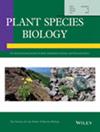人为和自然干扰增加了早春地肤植物(Ficaria verna Huds)的地方遗传多样性
IF 1.3
4区 生物学
Q4 ECOLOGY
引用次数: 0
摘要
四倍体Ficaria verna是中欧常见的春季地生植物,在美国和加拿大被认为是入侵物种。它被认为是一种几乎没有种子的类群,依靠地下块茎和气生球茎进行无性繁殖。最近的研究发现,F. verna 的种群遗传多样性水平很高,这就提出了一个问题:遗传多样性是如何维持的?该研究建立了多态核微卫星标记,以确定多焦点基因型(MLGs),利用网格和交叉取样方案分析精细尺度空间遗传结构(SGS),并对德国中部不同干扰机制下的九个种群内部和种群之间的遗传多样性进行量化。在总共 347 个样本中,共鉴定出 115 个多基因组。不同种群之间的 G/N 比值介于 0.16 和 0.70 之间,每个种群都有多个独特的多基因组。种群内的基因型高度混杂,表明存在 "游击 "传播策略。在9个种群中,有4个种群在精细交叉取样(最多4米)中发现了显著的SGS(亲缘关系系数与个体间距离的负回归斜率),只有1个种群在网格取样(最多14.6米)中发现了显著的SGS(亲缘关系系数与个体间距离的负回归斜率)。在一个以上的种群中没有发现单一的多基因组,而许多等位基因在种群之间是共享的。种群内的克隆和等位基因多样性随着人为和自然干扰的增加而增加。有规律的间隙开口、有利于繁殖体的建立以及水和割草机的繁殖体散播可能是干扰对F. verna当地遗传多样性产生积极影响的重要原因。本文章由计算机程序翻译,如有差异,请以英文原文为准。

Anthropogenic and natural disturbances increase local genetic diversity in an early spring geophyte (Ficaria verna Huds)
The tetraploid Ficaria verna is a common spring geophyte in central Europe and is considered invasive in the USA and Canada. It is considered an almost seed-sterile taxon, relying on vegetative reproduction by underground tubers and aerial bulbils. Recent studies have revealed high levels of population genetic diversity in F. verna, raising the question of how genetic diversity is maintained and which factors may be responsible for the observed patterns. Polymorphic nuclear microsatellite markers were established to define multi-locus genotypes (MLGs), to analyze fine-scale spatial genetic structure (SGS) using grid and cross-sampling schemes, and to quantify genetic diversity within and between nine populations with different disturbance regimes in central Germany. In total, 115 MLGs were identified among a total of 347 samples. The G/N ratio varied between 0.16 and 0.70 among populations, and in each population several unique MLGs occurred. Genotypes were highly intermingled within populations, suggesting a “guerrilla” dispersal strategy. Significant SGS (negative regression slope of kinship coefficients against inter-individual distances) was found in four out of nine populations in fine-scale cross-sampling (up to 4 m) and in only one population in grid sampling (up to 14.6 m). No single MLG was found in more than one population, while many alleles were shared between populations. Within-population clonal and allelic diversity increased with greater exposure to both anthropogenic and natural disturbances. Regular gap openings, facilitated propagule establishment, and propagule dispersal by water and mowing machines are likely important factors explaining the positive effects of disturbance on local genetic diversity of F. verna.
求助全文
通过发布文献求助,成功后即可免费获取论文全文。
去求助
来源期刊

Plant Species Biology
生物-生态学
CiteScore
2.70
自引率
14.30%
发文量
36
审稿时长
>12 weeks
期刊介绍:
Plant Species Biology is published four times a year by The Society for the Study of Species Biology. Plant Species Biology publishes research manuscripts in the fields of population biology, pollination biology, evolutionary ecology, biosystematics, co-evolution, and any other related fields in biology. In addition to full length papers, the journal also includes short research papers as notes and comments. Invited articles may be accepted or occasion at the request of the Editorial Board. Manuscripts should contain new results of empirical and/or theoretical investigations concerning facts, processes, mechanisms or concepts of evolutionary as well as biological phenomena. Papers that are purely descriptive are not suitable for this journal. Notes & comments of the following contents will not be accepted for publication: Development of DNA markers. The journal is introducing ''Life history monographs of Japanese plant species''. The journal is dedicated to minimizing the time between submission, review and publication and to providing a high quality forum for original research in Plant Species Biology.
 求助内容:
求助内容: 应助结果提醒方式:
应助结果提醒方式:


